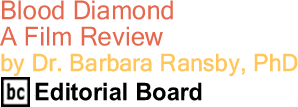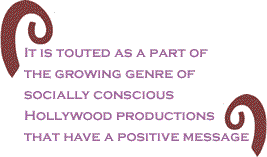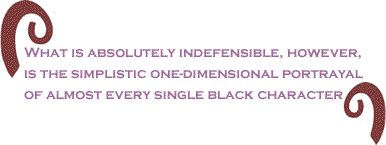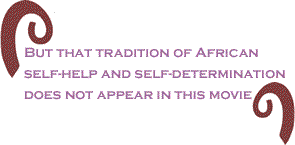
|
|||||||||||||||||||||
 |
|||||||||||||||||||||
 |
|||||||||||||||||||||
 |
|||||||||||||||||||||
 |
|
I went to this film with high expectations. It is
touted as a part of the growing genre of socially conscious Hollywood
productions that have a positive message. In this case the message
is that our frivolous attachment to the world’s most expensive gems
is one that fuels violence and friction in desperate and impoverished
African countries like Sierra Leone. That good message however,
is loudly drowned out by the many bad ones. And the bad messages
are not about the diamonds but about the people of Africa. I walked
away from DiCaprio, a bitter racist who clings fondly to good old days of pre-independence Zimbabwe, where he grew up, is the hero of the movie. He calls himself Rhodesian in open defiance of black majority rule that came with the end of the Apartheid-like system in Rhodesia (renamed Zimbabwe) in 1980. And in a fit of rage he lashes out at his reluctant black collaborator, Djimon Hounsou, as a “kaffir,” the African equivalent of the n-word. His goal in life is to steal, swindle or otherwise procure enough diamonds to buy his way out of Africa, a place he sees as God-forsaken and doomed. When there is no other way out, he finally redeems himself in a gesture of generosity at the end.
Of course, good fictional characters, like real people, are always complex so I don’t have an issue with Danny Archer, DiCaprio’s character, and DiCaprio’s acting is phenomenal. What is absolutely indefensible, however, is the simplistic one-dimensional portrayal of almost every single black character. Each and every one is either a blood-thirsty mindless killer and pillager or a childlike noble savage and feeble victim. The talented Hounsou is the later. He is cast as hapless, helpless and clueless in the land of his birth. He is a big innocent good guy who would not know whether to run toward or away from the gunfire if DiCaprio did not pull him in the right direction. OK, he is a rural fisherman so perhaps he would not know how to navigate the city streets of Sierra Leone’s capital, but in the rugged terrain of the jungle he is equally naïve and perpetually confused. In a classic scene that captures the contradictions of the movie, Hounsou puts his and DiCaprio’s lives in danger by acting with the impulse of a two-year old in the face of armed opponents. Moreover, there are no black women in Africa that utter more than two sentences, either “help me, help me,” as one is being kidnapped or a proposition to offer sexual services to the “big white man who is all alone” in the city. There is no black agency in this film, except for one school master who tries to rehabilitate child soldiers only to be shot by one of them five minutes after he appears on screen. Viewers are left to conclude the age-old racist stereotype that Africa is lost without European sympathy, know-how and might.
This genre of film advertises itself as something more than banal entertainment. It promises to raise awareness and consciousness about serious problems in the world. At the end of the credits there are a set of statistics that drive home that the subject of the film is real and serious. The narrative and storyline, however, distorts more than it illuminates the real players involved. For every child soldier and blood-thirsty rebel there are compassionate social workers and reformers, intellectuals, writers, and opposition politicians. There are Africans who are tough and tender, savvy and sinister and the whole range of personalities and motivations that we see in any other group. Among blacks in Africa, 90% of the continent of sub-Saharan Africa, we see more diversity than among the handful of whites. Hounsou’s character however does not show the intelligence and creativity that so many Africans have exhibited in response to inhumane conditions. Real people who have fought to save their country from violence and internal chaos like human rights activist FannyAnn Eddy who was tortured and killed in 2004 for her outspoken actions on behalf of lesbians, gays and women. But that tradition of African self-help and self-determination does not appear in this movie. This producer and director, Edward Zwick could not somehow see beyond the one-dimensional types and simple binaries we have been fed through television for generations. After African Queen, The Constant Gardener, the Interpreter, and now Blood Diamond, and with the notable exception of Hotel Rwanda, when will Hollywood be able to make a movie about Africa that actually acknowledges the full humanity of black African people? BC Editorial Board member Dr. Barbara Ransby, PhD is an Historian, writer, and longtime political activist. Dr. Ransby is currently an associate professor at the University of Illinois at Chicago in the Departments of African American Studies and History. Click here to contact Dr. Ransby. |
|
| Home | |
| December 21, 2006 Issue 211 |
||||||||||||||
|
||||||||||||||
| Printer Friendly Version in resizeable plain text format | ||||||||||||||
 |
||||||||||||||
|
||||||||||||||
 |
||||||||||||||
 |
||||||||||||||
 |
||||||||||||||
 |
||||||||||||||
| |
||||||||||||||
| |
||||||||||||||






























